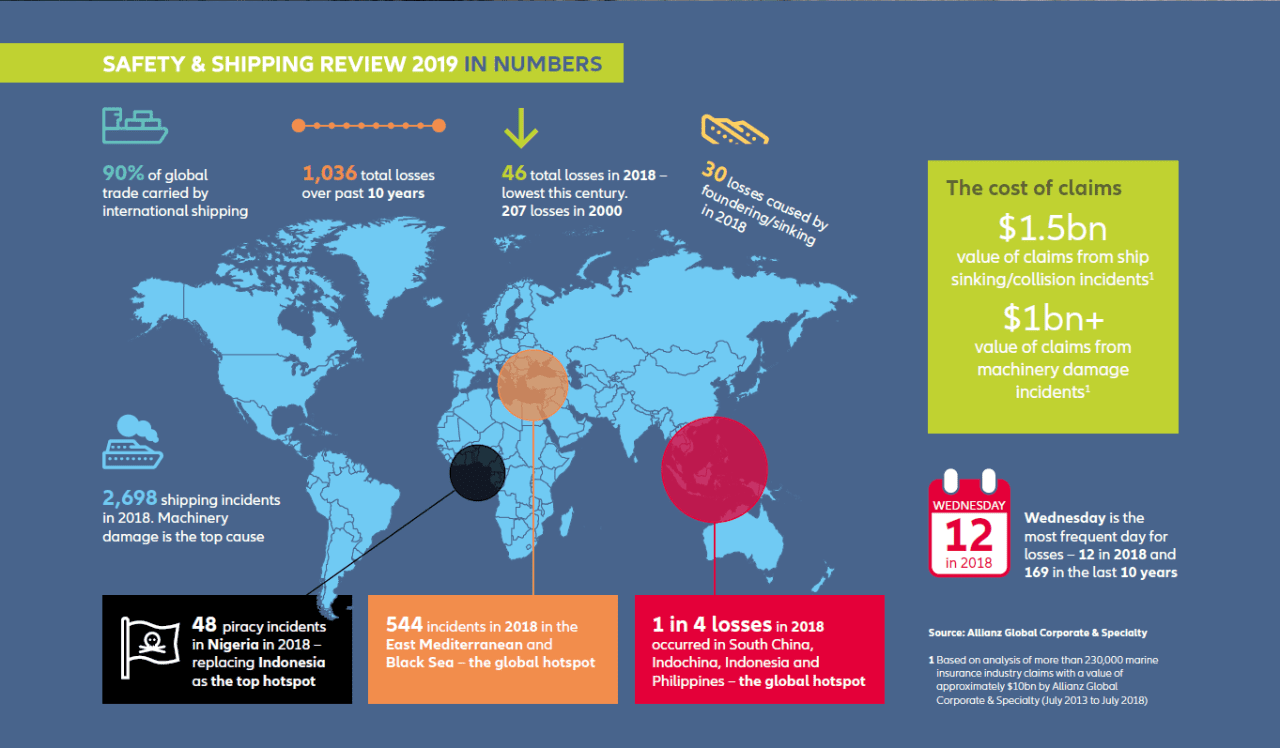Graphic courtesy Allianz Global Corporate & Specialty SE
Large shipping losses in 2018 fell to their lowest level this century, having declined by over 50% year-over-year, according to Allianz Global Corporate & Specialty SE’s annual review of shipping losses over 100 gross tons.
Allianz’s Safety & Shipping Review 2019, which was released Tuesday, showed a total of 46 total losses around the world in 2018, down from 98 in 2017, driven by a significant decline in number of losses in accident hotspots like South East Asia. Weather losses also halved due to quieter hurricane and typhoon seasons.
While Allianz notes that while this drop in total losses is encouraging, the 2,698 reported shipping incidents reported overall shows only small decline of less than 1% year-over-year.
Machinery damage is the major cause, accounting for more than a third of the more than 26,000 incidents over the past decade, nearly twice as many as the next highest cause, collision. Machinery damage is one of the most expensive causes of marine insurance claims, accounting for more than US $1 billion in five years, the report showed.
Despite the somewhat encouraging news, challenges such as political threats to vessel security, the impact of IMO 2020, and the growing number of fire incidents continue to pose a threat to global shipping.
“Today’s record low total loss activity is certainly influenced by fortunate circumstances in 2018, but it also underlines the culmination of the long-term improvement of safety in the global shipping industry,” says Baptiste Ossena, Global Product Leader Hull & Marine Liabilities at Allianz. “Improved ship design, technology, tighter regulation and more robust safety management systems on vessels have also helped to prevent breakdowns and accidents from turning into major losses. However, the lack of an overall fall in shipping incidents, heightened political risks to vessel security, complying with 2020 emissions rules and the growing number of fires on board bring challenges.”
Losses by Location
The South China, Indochina, Indonesia and Philippines region remains the top loss location, accounting for approximately 25 percent of the 48 total losses worldwide in 2018, according to the report.
The East Mediterranean and Black Sea and the British Isles rank second and third with six and four total losses, respectively. Allianz notes that despite signs of improvement, Asia will remain a hotspot for marine claims due to its high level of trade, busy shipping routes and older fleets.
Losses by Ship Type and Cause
Cargo ships, with 15 total losses in 2018, accounted for about a third of the vessels lost around the world in the past year. The most common cause of ship losses remains foundering (or sinking), which has accounted for over half of the 1,036 lost over the past decade. In 2018, 30 cases were reported.
Fires continue to generate a large number of losses on board, with the number of reported incidents trending upwards. This upward trend has continued through 2019 with a number of recent problems on container ships and three significant events on car carriers earlier this year. Mis-declared cargo, including incorrect labelling/packaging of dangerous goods, is believed to be behind a number of fires at sea. Meanwhile, the loss of hundreds of containers over board from the containership MSC Zoe in early 2019 serves as a reminder that damaged goods is the most common cause of marine insurance claims, accounting for one in five over five years, according to Allianz.
IMO 2020 Challenges
The International Maritime Organization’s 2020 regulations limiting the content of sulphur used in ship fuel from January 2020 is likely to be a game- changer for the shipping industry, with wide-ranging implications for cost, compliance and crew that increase the risk breakdowns and other types of disruptions.
“It is important shipping plays its part in a more sustainable environment. However, despite the fast approaching deadline, there is still a lack of international standards and concern over the availability and compatibility of low-sulphur fuel,” explains Captain Rahul Khanna, Global Head of Marine Risk Consulting, Allianz. “Insurers are concerned about a potential increase in machinery breakdown claims with the introduction of low sulphur fuels if the transition is not well-managed. There is also potential for disruptions and delays to voyages if there is a lack of compliant, compatible fuel in port.”
Security Threats
Political risk has heightened around the globe and increasingly poses a threat to shipping security, trade and supply chains through conflicts, territorial disputes, cyber-attacks, sanctions, piracy and even sabotage, as evidenced by recent attacks on oil tankers in the Middle East, according to Allianz. Also, the growing number of migrants at sea and an increase in the number of stowaways found on commercial vessels has serious consequences for ship owners, leading to delays, diversions and pressure on crew. Piracy incidents also increased in 2018 to more than 200, with Nigeria now the top global hotspot.
Other risk topics highlighted in the Allianz Safety And Shipping Review include:
- The growing number of incidents on larger vessels is concerning. Container-carrying capacity has almost doubled over a decade and a worst case loss scenario could cost as much as US $4bn in future.
- Trusting technology: Safety-enhancing technology in shipping has been a positive for safety and claims, yet accidents continue to happen due to over reliance – even down to losses occurring from crew being on phones.
- Autonomous shipping makes waves: Progress continues to be made but technology is not a panacea if the root cause of incidents and losses is not addressed.
- All at sea – The most accident-prone vessels of the last year are three Greek Island ferries, all of which were involved in eight different incidents.
Allianz’s complete Safety & Shipping Review 2019 can be found here.

 Join The Club
Join The Club











